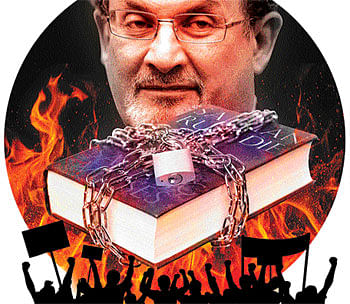The Rajasthan government’s role of hunting with the hounds and empathising with the hares by barring novelist Salman Rushdie from addressing the recently held Jaipur Literature festival has done irreparable damage to brand Rajasthan.

Many commentators argued that the state government’s decision to sabotage Salman Rushdie’s visit to Jaipur and even his appearance through video link was prompted by the compulsions of elections in five states, mainly Uttar Pradesh and its minority votebank.
But it is only partly true. State Chief Minister Ashok Gehlot, who was looking for some kind of redemption after the killing of 10 Meo Muslims in Gopalgarh, an hour’s drive from east of Jaipur, only four months ago, would have hardly missed this chance to wipe off some of the stains of the bloodshed and position himself as the messiah of the Muslims in the state. He wanted to prove that Gopalgarh was only an aberration.
Ten Meo Muslims, who had gathered at a mosque in Gopalgarh, were killed in police firing after a dispute over a piece of land with another community turned violent. The Gehlot government came under scathing criticism from not only the Opposition but also from the Congress high command, including Rahul Gandhi, who visited the site for a first hand account without informing the state government. The district collector and the superintendent of police were suspended and parallel CBI and judicial investigations are on. Gehlot just managed to save his chair.
By posturing as the new saviour of the minorities, Gehlot tried to assuage Rahul Gandhi who was reportedly upset with his handling of the massacre at Gopalgarh bordering UP in the run up to elections, appeased the Muslims who were demanding his ouster from chief ministership and insured himself against any possible setback in Uttar Pradesh. It is another matter that the condition of the Muslims in the desert state is worse than in many other states.
According to the Sacchar Committee’s 2006 report, in Rajasthan, 41 per cent of urban Muslims live below the poverty line, compared with 27 per cent Hindus.
Darul Uloom statement that Rushdie be denied a visa came as a God send to Gehlot. The chief minister rushed to Delhi and met Union Home minister Chidambaram and devised a plan. Accordingly, a security alert was issued.
Covert operation
To be fair to Gehlot, he never publicly announced that Rushdie is unwelcome though his officials worked overtime to keep him away from the festival at any cost. He only expressed concern about a breach of law and order vitiating the atmosphere at the festival as a fringe group of people were opposing Rushdie’s visit.
After Rushdie ridiculed the so called intelligence report about an assassination bid, and the Maharashtra police denying any intelligence sharing with Rajasthan government, the state police initially denied that they had sent any intelligence input to Rushdie. A senior police official told Deccan Herald: “Where did this intelligence report come from. We are not aware of any such report.”
However the government did a somersault and came up with a rebuttal from the Home Secretary which said: “Saquib Nachan, former General Secretary, SIMI is exploring the possibility of targetting Rushdie during his proposed visit. Separately, Saed Noorie, General Secretary, Raza Academy has announced a reward of Rs 1 lakh to anyone who would hurl a slipper at Rushdie during his visit to Jaipur.”
The second part of the statement was only a newspaper report and could not be construed as an intelligence report. In any case, this in no way supported the claim of the government that “two assassins are on way to Jaipur to eliminate Rushdie”, as had been communicated to the novelist.
When the organisers proposed a video link that would have allowed Rushdie to address the festival from abroad, after he had called off his visit, the police scuttled that move too by stating that it was not part of their original schedule and insisted that the organisers obtain fresh permission. On the morning of the last day of the festival when the tele link was scheduled, the police again changed their stand.
“There is no need for permission but the organisers would be held responsible for any consequences.” This absolved the police of any responsibility. This was enough for the motley group to sabotage the programme by barging to the venue.
The real truth remains that the government, at a meeting chaired by the chief minister on the previous day of the proposed tele link had already taken a decision to disallow it. What followed was a manufactured protest like the invented threat to Rushdie.
The latest instalment of the Satanic Verses saga is said to be election-related with five states in the fray and a sizeable Muslim votebank at stake. The Ashok Gehlot government in Rajasthan, however, has more to hide than what meets the eye. Sunday Spotlight analyses the fallout.
Related Stories: